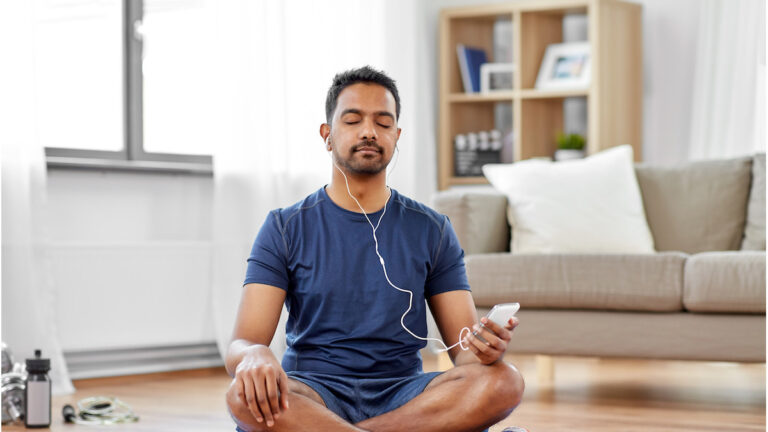Supermodel Bella Hadid revealed via TikTok that she struggles with anxiety when she wakes up in the morning.
“I don’t know if I’ve said this before, but I have the worst morning anxiety,” said Hadid in a TikTok post over the weekend. “In the mornings when I do my affirmations … it usually doesn’t work because I have so much anxiety. The only thing I can think about is my anxiety.”
Morning anxiety can be much more than just morning jitters. While it’s not a clinical diagnosis, morning anxiety (which experts say is indeed rooted in science) can happen to people whether or not they have an anxiety disorder.
If you find it hard to get going in the mornings due to overwhelming feelings of dread or physical symptoms like a racing heart or extreme fatigue, you may be experiencing morning anxiety, experts say. Here’s how to know if you might have it, and how to break the cycle.
Morning Anxiety: What It Is and Why It Happens
Morning anxiety is exactly what it sounds like — symptoms of anxiety that are stronger or more pronounced first thing in the morning.
Of course, if you’re gearing up for a big interview or exam, a little bit of pre-event anxiety is very common and understandable. But for many people, morning anxiety is present most or all mornings, regardless of whether something big is going on later in the day.
“Morning anxiety is absolutely a real thing,” says Camille Rex, a licensed professional counselor in private practice in Dripping Springs, Texas.
She points to factors including a poor night’s sleep, major life stressors, or even low blood sugar. One of the biggest culprits is the often vilified stress hormone cortisol.
Cortisol levels tend to be highest first thing in the morning, which helps explain why anxiety-related symptoms are often pronounced upon waking up.
This experience is termed the cortisol awakening response (CAR), according to a book titled Stress: Concepts, Cognition, Emotion, and Behavior. It’s been confirmed by multiple studies that measured individuals’ cortisol levels via saliva tests within their first hour of being awake.
“Cortisol is the stress hormone released by the adrenal glands in response to stress or fear,” explains Carolyn Rubenstein, PhD, a licensed psychologist practicing in Boca Raton, Florida.
But it’s worth pointing out that cortisol is released in response to the perception of a situation as stressful or frightening, even if the situation is not actually dangerous. For those with anxiety, increased levels of cortisol in the morning may amplify feelings of worry and fear. “Even if emotions are ‘exaggerated’ in the person’s mind, the process can still occur,” Dr. Rubenstein adds.
What Morning Anxiety Feels Like
Morning anxiety can feel like generalized anxiety, with physical and cognitive symptoms, says Rex. These may include racing thoughts, inability to concentrate, muscle tension, or a rapid heart rate, which are also associated with generalized anxiety disorder, or GAD.
The main difference between GAD and morning anxiety is that morning anxiety is limited to the first hour of the day, while GAD symptoms can interfere with everyday life, no matter what time it is.
Morning anxiety is often more prevalent — and more pronounced — in those with GAD or other anxiety disorders. It’s still possible to have morning anxiety symptoms even if you don’t have an anxiety disorder. But again, it’s not necessarily a clinical disorder itself.
Other possible morning anxiety symptoms, says Rubenstein, are:
Who Gets Morning Anxiety?
Morning anxiety by itself isn’t considered a clinical diagnosis like other forms of anxiety, such as GAD.
“Most people experience anxiety symptoms at some point in their lives; but not everyone meets the criteria for a diagnosis of clinical anxiety,” Rex says.
She adds that individuals with a lower tolerance in stressful situations — like a job interview or an exam — may be more likely to experience morning anxiety than those with a higher tolerance for stress.
Individuals with GAD or other anxiety disorders are more likely to experience morning anxiety, too. “People with an anxiety disorder are prone to anxiousness and are more susceptible to morning anxiety than someone who might merely feel ‘stressed’ when they have a big or important day ahead of them,” Rubenstein explains.
Even if you don’t have an anxiety disorder, Rex points out that it’s still helpful to acknowledge morning anxiety for what it is — a real issue that may be amplified because of CAR and other factors like sleep quality and overall health habits. “It’s often helpful to assign a label like morning anxiety to our feelings so we can come up with a plan for what to do next,” she says.
How to Better Cope With Morning Anxiety
It’s one thing to feel anxiety for a few mornings before you have something big coming up, like a court date or cross-country move, for instance. It’s another thing to feel like your mornings are being overtaken by stress, even when there are seemingly few major stressors in your life.
If morning anxiety is taking a toll on you, several strategies can help you keep it at bay.
1. Eat a Breakfast Rich in Fruits and Veggies
There are myriad reasons — mental health included — that breakfast is the most important meal of the day. “For those who skip breakfast, this causes a dip in blood sugar that can exacerbate anxiety,” says Rubenstein.
Some evidence suggests low blood sugar can make symptoms of anxiety worse, according to experts at the University of Michigan School of Public Health.
Not just any breakfast will do, though. “Healthy food [such as fruits and vegetables] can help raise blood glucose and reduce anxiety,” adds Rex. What’s more, increasing your intake of fruits and veggies can reduce worry and tension in general, according to research published in the May 2022 Frontiers in Nutrition.
Simple changes to your morning meal — such as a fruit and veggie-filled smoothie or the addition of avocado to a breakfast sandwich, for instance — can make your morning meal more healthful, which in turn may help anxiety symptoms.
2. Focus on Getting a Good Night’s Sleep
“Those who go to sleep with anxious thoughts are much more likely to wake in a similar state,” says Rubenstein. Additionally, a study published in December 2018 in Behaviour Research and Therapy found that participants who got less sleep than usual on some nights had increased anxiety symptoms the next day — and especially in the morning.
Taking steps to prioritize a good night’s sleep — like sleeping in a cool, dark room, and avoiding screens before bedtime, according to the Sleep Foundation — can help ensure you set yourself up for success the next day.
Other steps you could take to lower your anxiety or stress before bedtime, says Rubenstein: “Make a to-do list before you sleep so thoughts aren’t free-floating in your mind,” she says. “Listen to something pleasant and nontriggering.”
3. Cut Back on Caffeine and Other Stimulants
“Many turn to a morning cup of coffee with sugar to rev them up; however, this will increase anxiety,” warns Rubenstein.
Stimulants like caffeine and nicotine are found in coffee, green tea, cigarettes, and even some medications (many over-the-counter pain relievers include caffeine as an ingredient). Caffeine and nicotine are known to ramp up anxiety, according to ample research.
Instead of firing up the coffee maker or grabbing a cigarette first thing in the morning, try making a cup of low-caf or decaf herbal tea instead.
4. Start an Exercise Routine
“Exercising first thing in the morning is a great way to quickly boost your mood,” says Rex.
That’s because exercise helps release excess adrenaline, a brain chemical that can exacerbate feelings of anxiety, according to Mental Health America. Exercise also causes the body to produce the feel-good hormone dopamine, which regulates feelings of anxiety, according to research published in Archives of Iranian Medicine.
Morning exercise may give you the lift you need to relieve anxiety symptoms. But if first thing in the morning doesn’t work for you, don’t sweat it. Regular, routine exercise whenever it occurs will alleviate anxiety symptoms over the course of your day, according to research published in the British Journal of Sports Medicine.
Be sure to talk to your doctor before starting any new exercise routine to make sure it’s safe for you.
5. Don’t Drink Alcohol at Night
Grabbing one (or several) glasses of wine before bed may feel like a stress-buster at first, but come morning, it may actually worsen anxiety.
Excess alcohol alters brain and hormonal function in a way that increases symptoms of anxiety and can lead to panic attacks, according to American Addiction Centers. Alcohol also has negative effects on sleep, which can further exacerbate morning anxiety.
Pay attention to your anxiety levels during and after drinking. If you notice that you’re more anxious in the morning after drinking the night before, you may need to cut back on alcohol or avoid it entirely.
6. Recognize and Reframe Anxious Thoughts
You may also want to assess your thought processes when you’re feeling overwhelmed by anxiety. Reframe your thoughts to separate yourself from the spiral that can take place with anxious feelings.
“Instead of saying ‘I’m going to fail that exam today,’ you could catch yourself and say ‘I am having the thought that I am going to fail that exam today,’” Rex says. “Recognizing that our thoughts are just thoughts helps us to acknowledge the thoughts without allowing them to hijack our emotions and behaviors.”
7. Seek Professional Help if You Need It
If you have persistent anxiety that interferes with your daily life, even if it only occurs first thing in the morning, don’t ignore it.
“If the anxiety persists for an uncomfortable number of days or if it’s present throughout the day and impairs your ability to carry out your normal tasks, it might be time to reach out to a therapist or medical doctor to discuss your symptoms,” says Rex.
Your doctor may recommend certain treatments, such as psychotherapy or even medication in some cases, to bring you some relief.
This content was originally published here.




















